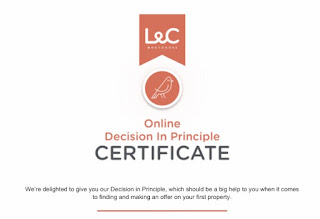Selecting a Mortgage (Buying my First Home)
Today, I wanted to share my experience of selecting a mortgage to help buy my first home. I didn’t realise how long the story of my mortgage would be so I’ve split it into selecting and securing. This is purely my experience and I am no expert, but having been through the process I feel I wish I’d known what to expect before. I am buying my house alone, therefore it’s a single person mortgage, so bare in mind the process may be slightly different from that perspective.
I began the process of finding a mortgage prior to even putting an offer in. I wanted to work out my budget by applying for a range of Mortgage Decision in Principles. I had 4 on paper, 3 with some of the most well known banks (Santander, Nationwide and NatWest) and one through a mortgage broker company called London and Country Mortgages. I actually really liked the latter because it searched a huge database, and provided a very clear certificate to give to agents. My quotes ranged from £145k to £196k, with he majority around £160k. I kept this in mind, but I could be relatively flexible with the amount of deposit I put down.
Once my offer was accepted, I did a little more research. I was initially hoping to go with Santander, as I already bank with them, so I felt it would be easier to provide evidence of funds etc. However, I also wanted to find the best mortgage rates and contracts.
I used Compare the Market to search mortgage rates. Whilst some smaller companies and loaners came up with the best rates, I didn’t feel comfortable using these and the first big bank was actually Santander.
There are few decisions that you need to make prior to searching:
1. The type of mortgage: interest only or repayment. For me, it didn’t make sense to do interest only and most mortgages are repayment. I was expecting the repayment to be roughly what my current rent is, so it wouldn’t affect my financials too much. Also, I wanted to reduce my mortgage, rather than keep it the same.
2. The contract length. This does depend on your current stage in life and if coming close to retirement can be more difficult. For me being relatively young, I made the decision to do it over 30 years, to keep repayments lower. My thought process was, that if I had additional flexible income at the end of the year, u could pay off a larger lump sum.
3. The type of interest rate: fixed or flexible, and for how long for. I personally wanted to know the exact amount to pay each month in the initial years of the contract so I asked for a fixed rate. Especially in the current market where interest rates are continuing to rise, I thought that these would likely settle by 2024. I had also made the decision to get a 2 year fixed rate mortgage, rather than 5 years or less, as I plan to have at least 2 years in the house on moving in.
4. The upfront costs and benefits. Some mortgages are free, whereas others cost up to £1000 as a product fee. In the end, ultimately the upfront cost usually works out cheaper in the long term, due to then lowering interest rates, however this is of course dependent on whether you have the funds available to afford that. I decided to go for the product fee, which was £995, because of this fact, but this also then meant that I had a £750 cash back as a further benefit, almost cancelling it out.
I started the mortgage application process with them, but with the current market, there was a 2 week wait for appointments. I picked the first appointment available and provided details required in the preliminary meeting. At this point, I had to provide wage slips and salary information for evidence and then it was a waiting process. Sadly, the next appointment wasn’t for another 2 weeks due to my shift pattern. I ended up getting a call about a week before saying that following submission of my evidence, the mortgage they could offer was much lower than anticipated, almost £30k lower. The main reason sited for this was that my overtime shifts weren’t consistent and my new salary didn’t come into effect until 3 days later, so they wouldn’t include this £5k pay rise.
I ended up making the decision at this point to cancel the application and go with someone else. The next best rates were with NatWest. When I did some research, I saw that the rates with a 20% deposit were significantly improved so I decided to go down this option. Stay tuned for next week’s post on securing my mortgage.

Comments
Post a Comment